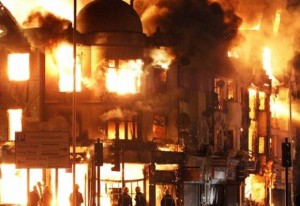 Commentary on the riots inLondon and other British cities has frequently made the point that what happened there could be a forerunner of something that might happen inAmerica. And why not? After all, it already has — think of Watts, think of the eruptions inWashingtonand other American cities after Dr. Martin Luther King was killed. The scenery is familiar — we’ve been here before.
Commentary on the riots inLondon and other British cities has frequently made the point that what happened there could be a forerunner of something that might happen inAmerica. And why not? After all, it already has — think of Watts, think of the eruptions inWashingtonand other American cities after Dr. Martin Luther King was killed. The scenery is familiar — we’ve been here before.
Yes, there are differences. The obsession in London with grabbing consumer goods was a distinctive, though not unique, feature — visible also in the U.S., to be sure, but perhaps not to the same degree. In the end, though, there’s more than enough similarity to warrant anxiety about what might lie ahead forAmerica. A police incident, an angry crowd, and manyU.S.cities could be in the hands of rioters and looters.
This isn’t a prediction. Maybe it won’t happen. God grant it doesn’t. But whoever says it couldn’t is living in a dream world.
That being so, it behooves Americans to take steps now to prevent it from happening if they can. Given the human propensity for ignoring potential problems until they become real ones, chances are good that won’t be done. But one can hope.
As a first step, it would be useful to reach agreement not only on what happened inLondon but why. As matters stand, there are significantly diverse views on that.
One version is that cutbacks in social problems, introduced by an austerity-minded government against the background of already existing poverty, provoked London’s poor and dispossessed to violent rebellion, just as it might do in the U.S. Emphasizing high unemployment, bad schools, a growing rich-poor income and lifestyle gap, and deepseated resentment as causal factors of human behavior, the explanation has about it more than a touch of economic determinism.
For their part, conservative analysts agree that the mindset of entitlement created by generous government social welfare programs had primed theirLondonrecipients to revolt, just as their American counterparts sooner or later may do. Stressing moral values (or their absence) as a cause, this explanation points to family breakdown, fatherless homes, greed, envy, permissiveness, and moral relativism as causes.
As a matter of fact, though, it’s not a case of either-or. Both of these explanations are partly right. It is simplistic to the point of absurdity to reduce the causes of the riots and looting to one thing only, whether the thing that supposedly explains everything be a set of economic grievances or a widespread moral collapse. Either explanation alone, without the other, presents a dangerously misleading picture of the social and individual pathologies that we witnessed in the streets ofLondon.
It’s just here that churches can play an important role — if they so choose. The gospel uniquely equips them to preach both parts of the message we need to hear — a message that underlines the importance of justice and equity in the economic realm side by side with moral values like family stability and a sense of personal responsibility.
This is to say that — to head off trouble if for no better reason — churches are in a strong position to make the point thatAmericaneeds a renewed, value-based secular culture in place of the decadent, morally bankrupt we’ve got now. Instead of blaming all our problems on poverty (on the one hand) or moral relativism (on the other), religious voices should be raised making the complex but realistic argument that both evils are deadly foes of a healthy civil society.



